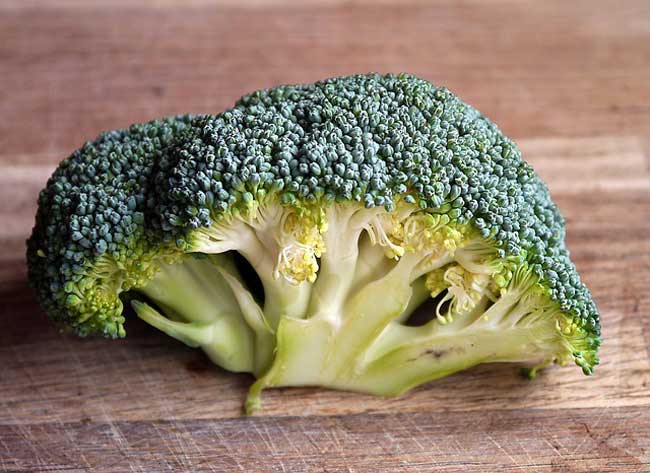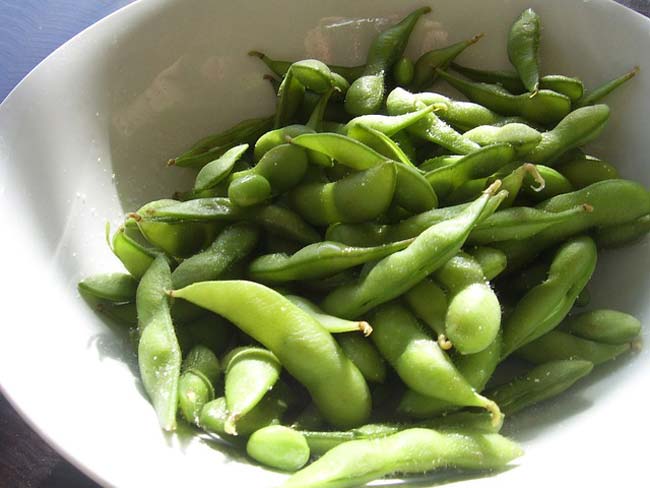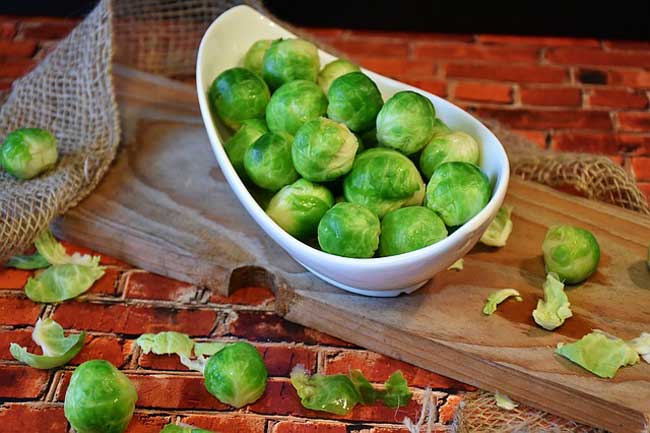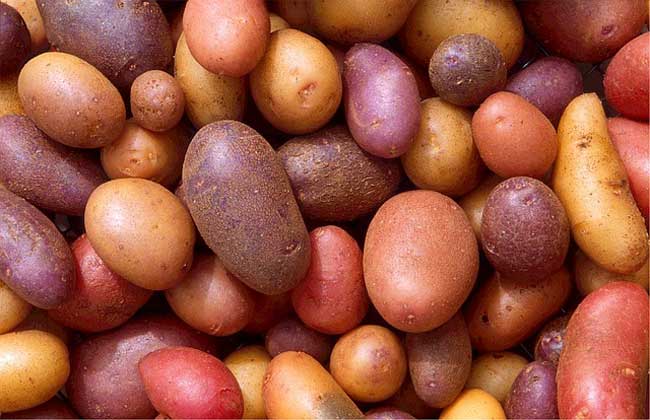Choline is a water-soluble essential nutrient nutrient. It was acknowledged as essential in 1998, by the Institute of Medicine.
This nutrient is often grouped with the vitamin B complex due similarities, but choline is not actually a vitamin or a mineral.
The human body does make some choline in the liver, but these amounts are fairly small. This means the majority must come through diet.

Broccoli contains 62mg of choline per cup.
Why We Need Choline
Choline is important for several body functions and has an impact on the liver and nervous system.
It is essential for making a substance required for removing cholesterol from your liver. Lack of choline may result in fat and cholesterol buildup in your liver (1).
Choline is necessary to make the fats that help support cell membranes, and is involved in the production of compounds that act as cell membranes (2).
Like B12 and folate, choline is involved in DNA synthesis, and is key in muscle functions and movement, including regulating the heartbeat
Choline RDI: Recommended Dietary Allowance
Currently, there is no Reference Daily Intake (RDI) available for choline. More research is needed to determine what the set amount should be.
But there is an adequate intake (AI) value which is thought to list the amount of choline necessary to remain healthy and prevent detrimental effects.
The adequate intake depends on age, with children 0-6 months requiring the smallest amount, and adult men the most.
The recommended values are as follows:
- 0-6 months: 125 mg/day
- 7-12 months: 150 mg/day
- 1-3 years: 200 mg/day
- 4-8 years: 250 mg/day
- 9-13 years: 375 mg/day
- 14-19 years: 400 mg/day for women and 550 mg/day for men
- Adult women: 425 mg/day
- Adult men: 550 mg/day
Breastfeeding women should get 550 mg per day, while those pregnant need slightly less, 450 mg per day.
More research is needed to determine the effects of choline intake on those with different genetic makeup. Some studies found that those who had adequate intake still developed a deficiency.

Soybeans – roasted – contain 107mg of choline per cup.
Choline Intake on a Vegan / Plant-Based Diet
Eating a plant-based diet that incorporates a lot of whole foods is the best way to ensure you are getting enough choline.
Many plant foods contain choline – though some in small amounts – so you should consume a variety of plant foods to meet the adequate intake.
Research into choline is relatively new, as is the data on the levels contained in specific foods. However, over 100 foods have been evaluated to help you determine the choline content of different foods.
=> See 25 Plant Based Choline Sources (Infographic)
While there are animal products that contain high levels of choline, animal products are not ideal sources of choline.
One major problem with animal products is the production of Trimethylamine N-oxide (TMAO) (3).
Certain bacteria in our gut turn choline into trimethylamine (TMA), which is absorbed into our system and oxidized by our liver into TMAO.
TMAO levels predict the risk of heart attacks, strokes, and death – independently of traditional cardiovascular risk factors.
This means that wether of not you have high cholesterol or low cholesterol, high blood pressure or low blood pressure, having high TMAO levels is bad news (4).
However, not all foods containing choline appear to cause the liver to oxidize TMAO.
Researchers took the vegetable highest in choline, Brussels sprouts, and had people eat two cups a day for three weeks.
Their TMAO levels actually went down. It turns out that Brussels sprouts appear to naturally down-regulate the TMAO liver enzyme (5).
Several studies on the connection between choline and prostate cancer also seem to point to animal products as the culprit rather than the choline source.
Those who consumed red and processed meat along with eggs and dairy had an increased risk of developing prostate cancer (6).
The issue appears to be the microbiome of meat eaters. Vegetarians and vegans have different gut microbial communities.
If don’t eat meat, then we don’t foster the growth of meat-eating bacteria in our gut. Indeed, people who eat completely plant-based may not make any TMAO at all, meaning that a high choline intake from plant foods is not necessarily problematic.
The issue is the type of foods you're eating, not necessarily the choline itself.

1 cup of Brussels sprouts contains 62mg choline.
Choline Deficiency Risks
Getting enough choline is important but most people seem to be getting enough through their diet.
In fact, some might argue the choline fear-mongering in the recent press is just that.
One study looked into choline intake based on body weight and found that most people are meeting adequate intake levels (7).
True deficiency is rare, but some people are more at risk than others.
Research suggests that postmenopausal women should be especially careful to prevent deficiency because it can lead to liver damage (8).
Pregnant women or those who are planning to conceive should also make sure to get enough choline to lower the risk of neural tube defects in their unborn babies.
Athletes who engage in endurance sports are another at-risk group because choline levels can drop over time during extended physical activity (9).
Choline Excess – Risks
It is also possible to get too much choline, which can lead to some unpleasant symptoms.
Adults should not exceed 3,500 mg per day in order to prevent liver damage, nausea, sweating, and decreased blood pressure.
This might seem a lot, but animal products like meat and eggs are very high in choline, and those consuming large a large number of calories from such foods may come close to this level of intake.
Health Effects
Heart Health
Research has demonstrated a link between choline and the risk of cardiovascular disease. Researchers found that a higher intake of choline was linked to decreased risks of heart disease (10).
It has also been observed that deficiencies in choline could lead to higher levels of homocysteine in the blood.
Research found homocysteine levels may have an impact on heart disease and stroke; adequate choline intake may prevent this (11).
Brain Health
The brain needs choline to produce a neurotransmitter called acetylcholine, which is key to functions such as memory and mood.
One study found that high choline intake was related to increased cognitive performance (12).
Memory
Older adults may benefit from choline supplementation to help improve their memory. One study found that 1,000 mg per day was enough to help improve short-term and long-term memory (13).
Another study on those in the early stages of Alzheimer’s disease found that receiving supplements that increased their plasma choline levels did lead to some small improvements.
However, other studies done on those with dementia and other healthy individuals did not show the same results (14).
Brain Development
Studies in animals suggest that choline may play a role in the brain development of a fetus during pregnancy.
One study, in particular, found that choline supplementation during development led to improved performance on cognitive and behavioral tests (15).
It’s unclear if these findings are comparable in humans though.
One study found that children whose mothers had a high intake of choline during pregnancy scored slightly better on visual memory tests by age 7 (16).
Mental Health
It is thought that choline may play a part in helping treat anxiety and bipolar disorder.
One study found that low levels of choline in the blood were associated with a greater risk of having anxiety (17).
Researchers also found that choline may help reduce mood symptoms in patients who have been diagnosed with bipolar disorder (18).
Cancer
Choline has also been linked to a decreased risk of breast and liver cancer.
One study found that women who consume a lot of choline may decrease the risk of breast cancer, as there seems to be an inverse relationship between dietary intake and cancer risk (19).
However, the findings are not conclusive because other studies have shown that high choline intake with a high risk of liver, prostate, and colon cancer.
As mentioned previously, it is likely that adequate choline is important but that getting this nutrient from animal products results in higher TMAO levels, and thus results in increased health risks. Yet being deficient, regardless of the source, also results in poorer health.
Pregnancy
Getting enough choline in your diet is important in reducing the risk of neural tube defects. One study found that women who had a high intake at the time of conception resulted in babies who had a lower risk of defects (20).
The lack of choline was also studied and it was found that women with the lowest intake of choline were more likely to experience neural tube defects in their babies (21).
Other research did not identify choline as a risk factor in development (22).

1 large red potato comes packed with 57mg of choline.
Best Vegan Sources of Choline
Two of the best vegetable sources of choline are broccoli and cauliflower. These cruciferous vegetables contain 31.3 mg and 24.2 mg per half-cup, respectively.
Green peas contain 47.5 mg per one cup, while navy beans have 8.14 mg in a single cup. Cashews are also high in choline, containing 61 mg in 100 grams.
Although meat and eggs are very high in choline, they are not considered healthy options because they lead to an increase in TMAO, and have independently been linked to cancer and heart disease.
=> Download a printable choline sources chart here
Supplementation
Those who do not get enough choline through their diet may consider supplementing. However, it is unclear whether this is a healthy way to increase your choline intake.
One study found that those who were given an oral choline supplement totaling approximately 450 mg per day for two months experienced an increase in TMAO levels (23).
Although a supplement can increase choline levels, the risk may outweigh the benefit because of the resulting high TMAO levels associated with a greater risk of heart disease.
Choline, In Summary
Choline is an essential nutrient and is easily obtained through eating a plant-based diet that comprises a wide variety of whole foods.
You shouldn’t need to supplement because numerous plant foods contain choline. The body can also produce a small amount itself.
To prevent the production of TMAO in the liver, it is recommended that you get your choline intake from plant-based sources instead of animal products or supplements.
Although there is no official RDI, make sure your daily intake is more than 300 mg a day but less than 500 mg.
Athletes, postmenopausal and pregnant or lactating women may need a higher intake, as recommended by the AI information earlier in the post.


![Vegan Vs. Vegetarian – What's the Difference [And is There Beef?] vegan vs vegetarian](https://www.theplantway.com/wp-content/uploads/2015/01/vegan-vs-vegetarian.jpg)

Leave a Reply